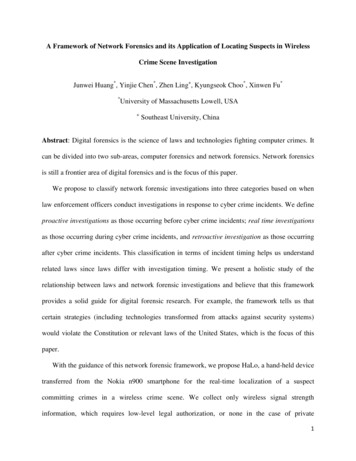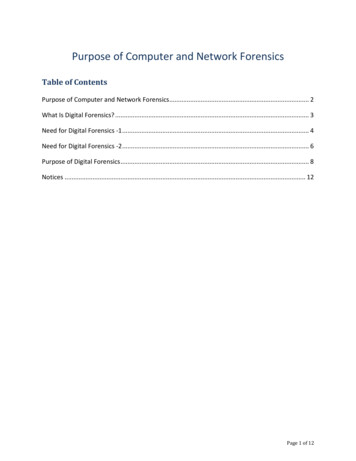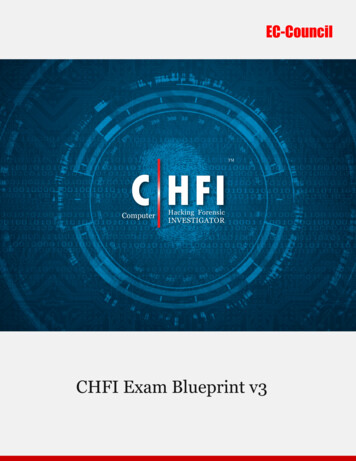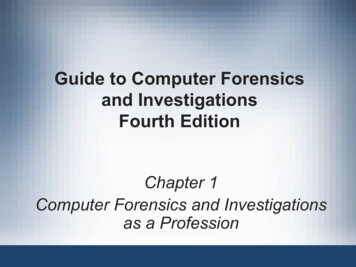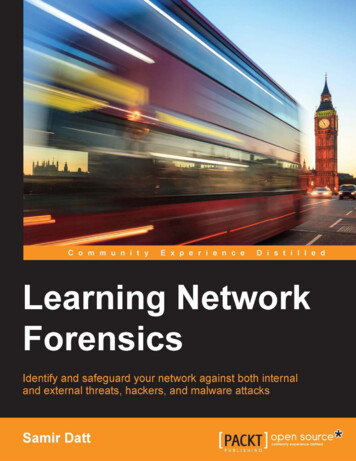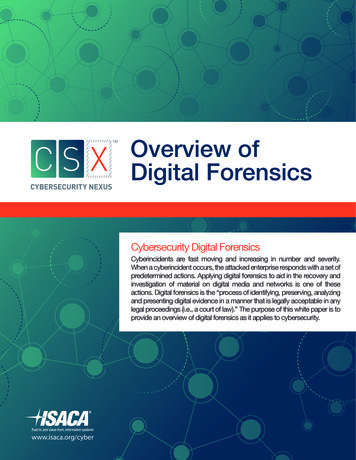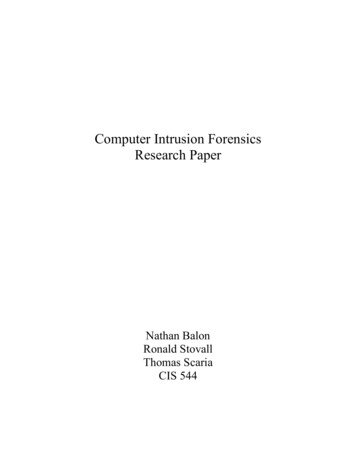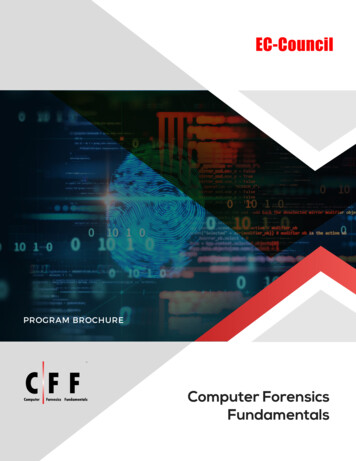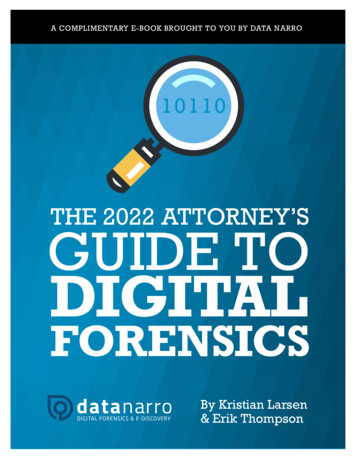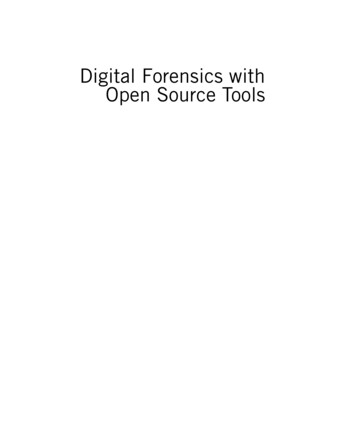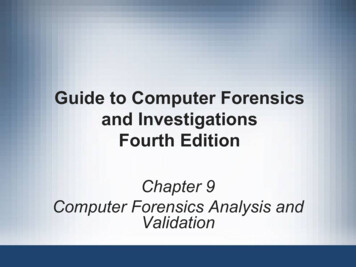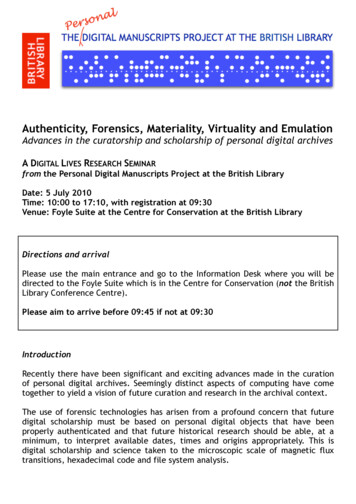
Transcription
Authenticity, Forensics, Materiality, Virtuality and EmulationAdvances in the curatorship and scholarship of personal digital archivesA DIGITAL LIVES RESEARCH SEMINARfrom the Personal Digital Manuscripts Project at the British LibraryDate: 5 July 2010Time: 10:00 to 17:10, with registration at 09:30Venue: Foyle Suite at the Centre for Conservation at the British LibraryDirections and arrivalPlease use the main entrance and go to the Information Desk where you will bedirected to the Foyle Suite which is in the Centre for Conservation (not the BritishLibrary Conference Centre).Please aim to arrive before 09:45 if not at 09:30IntroductionRecently there have been significant and exciting advances made in the curationof personal digital archives. Seemingly distinct aspects of computing have cometogether to yield a vision of future curation and research in the archival context.The use of forensic technologies has arisen from a profound concern that futuredigital scholarship must be based on personal digital objects that have beenproperly authenticated and that future historical research should be able, at aminimum, to interpret available dates, times and origins appropriately. This isdigital scholarship and science taken to the microscopic scale of magnetic fluxtransitions, hexadecimal code and file system analysis.
At the same time there has been a desire to capture the context of creativity andhistorical happening in the fullest way, and this is manifesting itself within thecomputer environment, at the mesoscopic scale, in the evocative viewing of thepersonal digital objects through the original graphical user interface, completewith desktop layout, folder directories, application toolbars, and networkvolumes, resources and venues, and in the selection of menu items with a mouse,trackpad or touch screen - with this research experience being made possiblethrough the use of emulators and virtual machines and bootable disk images.Beyond the original computer environment, there is the capture of the physicalenvironment through immersive photography, 3D graphical imagery andaudiovisual interviews in the presence of archival objects. This is digitalscholarship at the macroscopic scale of the virtual experience of local landscapesof home and study, of lab and studio.Within the British Library, the Personal Digital Manuscripts Project has recentlybeen reinvigorated by internal funding, and it will be introduced over the courseof the seminar. Its aim is to provide for enhanced curation, for the integration ofdigital and analogue components of personal archives, and for streamlinedworkflows through authenticated capture, processing and access of personaldigital objects via emulation as well as migration.Invited SpeakersErika Farr and Naomi Nelson of Emory University will report on the pioneeringuse of emulation for the digital archives of Salman Rushdie. In the words of theirintroduction to the emulated environment: “Rushdie’s exact directory structure isavailable to browse, and each file can be opened in the application in which itwas created, such as MacWrite Pro or ClarisWorks”.Christine A. Finn writer, broadcaster and researcher, and Research Associate ofthe University of Bradford, will provide an account of her original research withthe vintage computer community and of the classic computers themselves ascontemporary archaeological Artifacts, the title of the book that arose from herfieldwork in the Silicon Valley.Vincent Joguin President and CEO of Joguin SAS will provide an overview of theEU-funded project Keeping Emulation Environments Portable (KEEP) including anintroduction to the Olonys universal virtual machine (which he codesigned forlongterm portability) and the Disk2FDI software for floppy disk imaging.Matthew G. Kirschenbaum of the University of Maryland will discuss digitalmateriality from the perspective of the humanities researcher, arising in part fromhis exploration of computer media forensics and restorative activities in capturingdigital creativity, and following on from his ground-breaking book Mechanisms.New Media and the Forensic Imagination.
Michael G. Olson of Stanford University Libraries will report on his establishmentof a Digital Forensics Lab for digital archives (the first of its kind in the USA) andthe context of his work with personal archives including that of the evolutionarybiologist Stephen Jay Gould.Jussi Parikka of Anglia Ruskin University who conducted his doctoral thesis on amedia archaeology of computer worms and viruses at the University of Turku willdiscuss some of his more recent research as well as a multidisciplinary initiative,the Cultures of the Digital Economy Research Institute (CoDE), of which he isDirector.Daniela Petrelli of the University of Sheffield will reflect on the findings of the EUMarie Curie project Memoir: Remembering Things Past, an examination ofpersonal digital objects as the source of memories, most especiallyautobiographical. The design and impact of digital devices that are integrated ineveryday life and enable ready recollection and reflection will be contemplated.Gabriela Redwine of the Harry Ransom Center at the University of Texas willintroduce aspects of the Mellon-funded project that is producing a report entitledComputer Forensics and Born-Digital Content in Cultural Heritage Collections, ofwhich she is a coauthor along with Richard Ovenden of the Bodleian Library of theUniversity of Oxford and principal author Matt Kirschenbaum of the University ofMaryland. She will briefly consider some of the ethical issues that arise in the useof forensic technologies.Seth Shaw of the Rare Book, Manuscript and Special Collections Library of DukeUniversity will discuss recent collecting efforts including the ‘papers’ of ePoetStephanie Strickland, and with a brief note on work with the emails of theeconomics Nobel laureate Leonid Hurwicz.Matt Shreeve of Curtis Cartwright Consulting will introduce the JISC project thatis directed at Clarifying the Purpose and Benefits of Preserving Software, inassociation with the newly founded Software Sustainability Institute.Jeff Ubois who is exploring new approaches to personal archiving for Fujitsu Labsof America will summarise the Personal Archiving 2010 conference which heorganised in San Francisco and will discuss future possibilities.Kieron Wilkinson and István Fábián of the Software Preservation Society will givea talk and a very exciting pre-release demo of the ready-built KryoFlux equipmentthat provides for extremely low level and accurate capture and analysis of floppydisks.Simon Wilson, a digital archivist at Hull History Centre will provide an overview ofthe international project Born-Digital Collections: An Inter-Institutional Model forStewardship (AIMS) involving collaboration between University of Virginia, HullUniversity, Stanford University and Yale University.
Members of the British LibraryHelen Broderick of the Personal Digital Manuscripts Project will describe aspectsof cataloguing and making available digital personal archives by means of theBritish Library’s newly instituted eMSS Server, and the enhancement of thearchive through immersive photography of the creative environment: exampleswill stem from the archives of Ronald Harwood, Ted Hughes and Harold Pinter.Jude England Head of Social Sciences will chair the final session.Kristian Jensen Head of Arts and Humanities and SRO of the Personal DigitalManuscripts Project will provide a brief welcome and introduction.Jeremy Leighton John of the Personal Digital Manuscripts Project will highlightsome of the findings of the Digital Lives Research Project (funded by the UK’s Artsand Humanities Research Council) including the use of forensic techniques in thearchival and historical context. In particular, the concept of Virtual ArchivalComputing, the use of virtual machines, VM snapshots and the booting of diskimages within a forensic framework and over a network will be elaborated. Therewill be examples from the archives of evolutionary biologists William D. Hamiltonand John Maynard Smith.Demos, Overviews and TopicsBeyond the presentations themselves there will be demos of the forensic captureof digital media involving write-blockers and forensic equipment; and theKryoFlux technology.An outline of the recent developments of the EU-funded Planets project(Preservation and Long-term Access through Networked Services, led by the BritishLibrary) will be provided, specifically highlighting its contributions to emulationincluding a remote emulation service over the network, GRATE.Attendees will learn about or be able to discuss the following topics: Virtual archival computing and the use of bootable forensic disk images andvirtual machines as a means of providing repeatable and authenticated accessto original computer environments. Personal digital archives as a source of original software for longtermpreservation and as a motivating factor in this endeavour Low level capturing of magnetic flux transitions on floppy disks as well ashigher level bitstream capture that is accurate and measurable The anthropology and archaeology of the vintage computer community
Digital materiality? What is it and why does it matter? Universal virtual machines and open source emulators that are compliantwith digital preservation requirements Why use forensic technologies in the context of digital archives? What is enhanced curation? Highlights of the Digital Lives Research Project The eMSS Server at the British Library Issues of licensing and software inheritance and reuse Next steps: networked integrationSessions(0) 09:30 to 10:00 ARRIVAL AND REGISTRATION09:30-09:45 Registration with coffee, tea and biscuits09:45-09:55 Delegates to their seats09:55-10:00 Preparations at the podium(1) 10:00 to 11:25 DIGITAL MEDIA, COMPUTERS AND 0011:00-11:15Kristian JensenChristine Finn: Digital Lives Opening LectureJussi ParikkaDaniela PetrelliHelen Broderick11:15-11:25 Questions11:25-11:40 Break(2) 11:40 to 13:25 FORENSIC TECHNOLOGIES & DIGITAL CAPTURE AND 00Seth ShawMichael G. OlsonGabriela RedwineKieron Wilkinson and István Fábián: Digital Lives Technology Lecture
13:00-13:10 Questions13:10-13:25 Demonstrations of Disk Imaging13:25-14:00 Lunch(3) 14:00 to 15:40 DIGITAL MATERIALITY AND EMULATION14:00-14:25 Matthew G. Kirschenbaum: 21st Century Curatorship Seminar Lecture14:25-14:30 Questions14:30-14:50 Erika Farr and Naomi Nelson: Digital Lives Archival Lecture14:50-15:10 Jeremy Leighton John15:10-15:35 Vincent Joguin: Digital Lives Research Lecture15:35-15:40 Questions15:40-15:50 Break(4) 15:50 to 17:10 DISCUSSION, DEMONSTRATIONS, ISSUES AND SUGGESTIONS15:50-16:10 Presentations and demonstrations of emulation including work fromthe Planets Project on behalf of Maurice van den Dobbelsteen of Planets and theNational Archives of the Netherlands16:10-16:25 Special topic: the benefits and challenges of software preservationwith Matt Shreeve16:25-16:45 New initiatives in digital archiving: highlighting the potential forinstitutional collaboration and commercial engagement, with Simon P. Wilson andJeff Ubois16:45-17:05 New uses and new values in digital archiving: a discussion ofpossibilities, to be chaired by Jude England17:05-17:10 ConclusionDirections and arrival (reiterated)Please use the main entrance and go to the Information Desk where you will bedirected to the Foyle Suite which is in the Centre for Conservation (not theConference Centre). Doors open at 09:30Please aim to arrive before 09:45
OrganiserDr Jeremy Leighton JohnCurator of eMSS & Principal Investigator of the Digital Lives Research Projectemail: jeremy.johh@bl.ukDigital LivesSeminarAA DigitalLivesResearchResearchPaper
with desktop layout, folder directories, application toolbars, and network volumes, resources and venues, and in the selection of menu items with a mouse, trackpad or touch screen - with this research experience being made possible through the use of emulators and virtual machines and bootable disk images.
